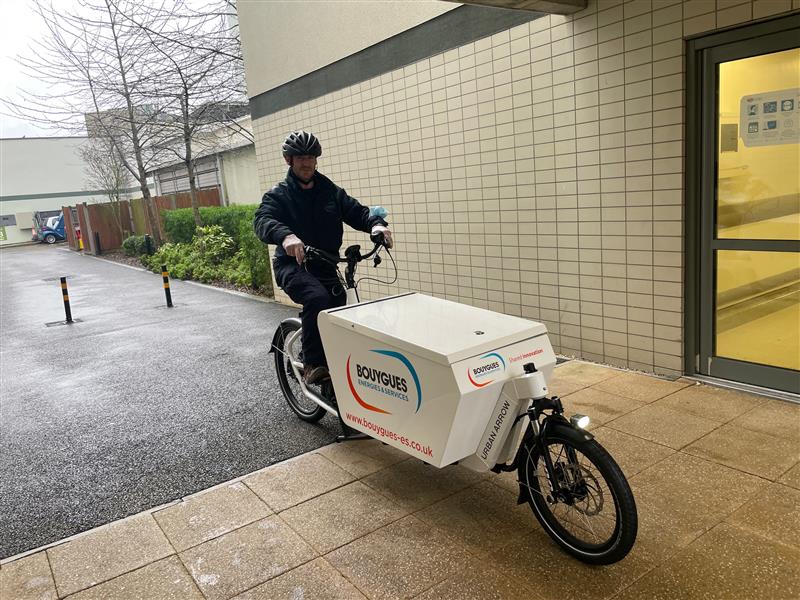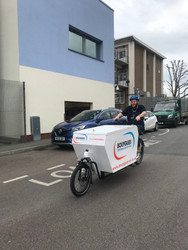With over 14,000 employees worldwide that provide engineering and service capabilities, Bouygues has put forward a climate strategy in response to the current emergency threatening our future. Part of their answer? You guessed it, cargo bikes! Bouygues have started their electrifying journey with a fleet of 15 cargo bikes, ranging from the front-boxed Urban Arrow Cargo L, to Riese & Müller Load 75’s to the rear-loading and enigmatic Tern GSD.

Two thirds of their fleet are currently operational within healthcare sites, at North Middlesex Hospital in Tottenham, Broomfield Hospital in Chelmsford and Southmead Hospital in Bristol. The other cargo bikes are operational at higher education sites, at Cambridge University and King’s College London, as well as with Westminster City Council in the centre of the capital.
The cargo bikes are being used in a wealth of different ways, with the primary intention to dramatically increase the air-quality surrounding the institutions they support. In just this short period since their arrival, North Middlesex Hospital has removed its diesel van, as the Urban Arrow is a more emission-friendly tool for the managing of waste and the transportation of cement within its grounds and gardens.
With Bouygues Construction being operational in the UK for over 20 years, and with the recent acquisition of Equans, who operate within regeneration and energy services, we expect the company to be at the forefront of green mobility for its sector, and pave the way for other conglomerates to follow suit.
We’re looking forward to seeing your cargo bikes make a real difference to your working environments, Bouygues and thank you for choosing Fully Charged.
Interview with Simon Hayman - Regional Director at Bouygues E&S Solutions Ltd:
What was the initial problem you were trying to resolve when looking into cargo bikes?
To put it simply, reducing our carbon footprint. Did you know that carbon is used in the construction process of erecting a building than is used in the following 40 years of the ongoing running of that particular building? Did you also know that over 40% of the carbon generated in the world is the result of construction? We know we have massive strides to take as a company in order to help reduce our carbon footprint, not least within fleet travel, which accounts for the majority of carbon that is emitted from any of our contracts. To that end, we’ve made it our goal to meet our Net Zero target by 2023.
The implementation of alternative methods of transport, such as EV’s and hybrid vehicles, seemed a natural step in the right direction. However, it soon became apparent that EV vans are not suitable for every use-case, and with a low daily mileage and within certain working parameters, it became clear that a non-conventional mode of travel such as an electric cargo bike could make a real difference.
What was the attraction of cargo bikes for your business?
The attraction was two fold. The first is very much self-explanatory, but only once you really begin to use them and understand just how effective they are! Aside from their green credentials, cargo bikes are far better suited to urban environments than vans. Secondly, they can assist in improving the quality of the air we breathe, which is of fundamental importance for us when being the sole-contractor for hospitals, city councils, schools and universities, for evident health reasons.An additional bonus to the cargo bikes is the branding and advertising opportunities that come with them. Of course, as a construction and energy services provider, we believe it’s essential for any authority or business when choosing a construction partner to pick an enterprise that minimizes their carbon footprint of your project. To have our branding on the front box of these bikes reflects what we’re trying to achieve, and hopefully can have a small-impact on the decision making of other companies looking to use our services. Of course, a cargo bike is far more of a head-turner than a diesel van!
How are you utilising the cargo bikes?
We currently have a fleet of 15 cargo bikes, both front-loading, as is the case with the Urban Arrow Cargo L and the Riese & Müller Load75, and rear-loading with the Tern GSD. To be truthful, we didn’t quite know how we should be using them at the start! Our sole purpose was to reduce our carbon footprint, so that was why we initially conceived the idea. However, it soon became apparent that providing we gave our staff sufficient training, our workforce started to use them in a wealth of different ways. Whether it is collecting waste from bins within these institutions, maneuvering various products, or transporting salt sacks of cement, we’ve already seen the effects it can have.
Bouygues is supporting North Middlesex University Hospital (NMUH), and in doing so protecting the health and wellbeing of local people through the deployment of sustainable transport. Did you know that air pollution in the London borough of Enfield is on average greater than the maximum established for one year by the World Health Organisation?!We have helped assist NMUH to educe their CO2 emissions by installing EV charging points across their site and removing a 3.5T diesel flatback van for a Bosch powered cargo bikes! This was a huge winning story for us as a business, and an example of what really can be done, especially within a healthcare environment where the quality of air patients and staff breathe is of the highest priority. Of course, the technology is not that dissimilar to the EV vans that are also now a part of our fleet, but the bike is far more nimble, agile and is being used on a far more regular basis than our van ever was.
How have the workforce taken to the bikes?
At the start uptake was slower than initially expected. It does take a considerable shift in mindset to implement real change when people are used to driving a car/van to do the same procedure. However, once we gave the workforce training (at Bike4Life City Guild) this had a great impact on usage. What’s more is the reaction of the workforce as to how much the bike can take, whilst being ridden. We have, at times, got 40/50 kgs of load in the front box, and yet the handling is rigid and solid. Our General Manager, Robert Dashwood, has commented that: Once the engineers got to grips with riding the bike empty, due to its physical length, they have been utilizing it for all their grounds maintenance work. Fundamentally, these bikes provide a good opportunity for a sustainable transportation solution for our grounds team.
How did you come across Fully Charged?
Of course, partnering with the right eBike specialist became a top priority. One who was knowledgeable, understood what we needed in order to make the most out of our investment, and also had the readying stock available once we looked to roll out the incentive.
Our Sustainability Lead here in the UK was given the contact details of Fully Charged at an event for the Southwark Council, a client of Fully Charged. Once he got given the green light from our Managing Director to look into cargo bikes, we met with Dan Parsons. What we both found remarkable was the array of front-loading and rear-loading options available to us. Dan let us trial out all cargo bikes on offer, before lending his expertise on what he thought would be the best bike for each particular use-case.
How have you found the bikes themselves?
I am no cargo bike expert, but I do genuinely believe that the bikes we have bought are of a particular quality. Considering we’re contracted to the four corners of the UK, it couldn’t be more important to have a reputable cargo bike with an integrated eBike system, such as Bosch. You can most definitely tell that these are resilient, durable, and make sure they get our jobs done on an hourly, daily, weekly, monthly and let’s hope, yearly basis!
We’ve brought half a dozen of the bikes back for their first service at the end of Q3, and they were all turned around in a day. Of course, now we’ve invested in these products, it’s vital that we receive such support in a quick and timely manner, as otherwise our workforce cannot play out their duties, leading to inefficiency of tasks. Fully Charged really do seem to put the client first.




